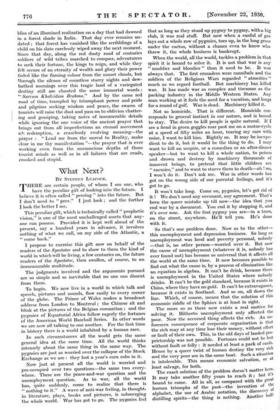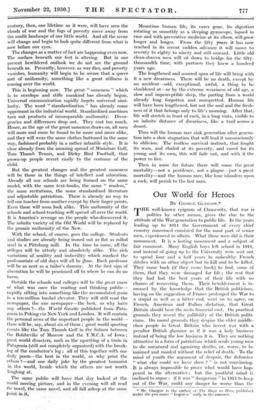What Next ?
BY STEPHEN LEACOCK.
THERE are certain people, of whom I am one, who have the peculiar gift of looking into the future. I believe it is often called " peering " into the future. But I don't need to " peer." I just look ; and the further I look the better I see.
This peculiar gift, which is technically called " prophetic vision," is one of the most unchallenged assets that any- one can possess. Provided it is kept well ahead of the present, say a hundred years in advance, it involves nothing of what we call, on my side of the Atlantic, a " come back."
I propose to exercise this gift now on behalf of the readers of the Spectator and to show to them the kind of world in which will be living, a few centuries on, the future readers of the Spectator, then swollen, of course, to an immeasurable multitude.
The judgments involved and the arguments pursued are so simple and so inevitable that no one can dissent from them.
To begin. We now live in a world in which talk and speech, pictures and sounds, flow easily to every corner of the globe. The Prince of Wales makes a broadcast address from London to Montreal ; the Chinese sit and blink at the pictures of the Belgian coronation ; and the pygmies of Equatorial Africa follow eagerly the fortunes of the American World Baseball Series. In other words we are now all talking to one another. For the first time in history there is a world inhabited by a human race.
In such circumstances all the world gets the same general idea at the same time. All the world thinks intensely about the same thing in the same way. The pygmies are just as worried over the collapse of the Stock Exchange as we are : they lost a year's corn cobs in it.
Now just at present all the world is worried and pre-occupied over two questions—the same two every- where. These are the peace-and-war question and the unemployment question. As to war, all the world has, quite suddenly, come to realize that there is " nothing to it." A wave of anti-war feeling, in thought, in literature, plays, books and pictures, is submerging the whole world. War has got to go. The pygmies feel
that as long as they stood up pygmy to pygmy, with a big club, it was real stuff. But now when a canful of gas lays out a whole row of pygmies, toes up, in the long grass under the cactus, without a chance even to know who threw it, the whole business is bankrupt.
When the world, all the world, tackles a problem in that spirit it is bound to solve it. It is not that war is any muddier and bloodier " than it used to be.. It was always that. The first crusaders were cannibals and the soldiers of the Religious Wars regarded " atrocities " much as we regard football. But machinery has killed war. It has made war as complex and tiresome as the packing industry in the Middle Western States. Any man working at it feels the need for a vacation, and longs for a round of golf. War is dead. Machinery killed it.
Not so homicide. That is different. Homicide cor- responds to general instinct in our nature, and is bound to stay. The desire to kill people is quite natural. If I see a fiend in green goggles roar past me on a motor-cycle at a speed of fifty miles an hour, tearing my ears with noise, I want to kill him. Rightly so. It may be inexpe- dient to do it, but it would be the thing to do. I may want to kill an umpire, or a comedian or an after-dinner speaker—but to want to kill a whole nation, to poison and drown and destroy by machinery thousands of innocent beings, to pretend that little children are " enemies," and to want to starve them to death—ah ! no, I won't do it. Don't ask me. War in other words has got on the wrong side of our parental feelings, and it's got to go.
It won't take long. Come on, pygmies, let's get rid of it 1 We don't need any covenant, any agreement. That's been the queer mistake up till now—the idea that you end war by a document. You end it by stopping it, and it's over now. Ask the first pygmy you see—in a tram, on the street, anywhere. He'll tell you. He's done with it.
So that's one problem done. Now as to the other— this unemployment and depression business. So long as unemployment was local and poverty personal, nobody —that is, no other person—worried over it. But now the cause of unemployment (whatever it is, nobody has ever found out) has become so universal that it affects all the world at the same time. It now becomes possible to find out what the cause is, by a process of elimination like an equation in algebra. It can't be drink, because there is unemployment in the United States where nobody drinks. It can't be the gold standard, because it exists in China, where they have no gold. It can't be extravagance, because it exists in Scotland. And so on, all down the line. Which, of course, means that the solution of this economic riddle of the Sphinx is at least in sight. The more so as there now exists a real motive for solving it. Hitherto unemployment only affected the poor. Now the accursed thing affects the rich. An un- foreseen consequence of corporate organization is that the rich may at any time lose their money, without effort or fault of their own. This, in the old days of landed pro- prietorship was not possible. Fortunes could not be lost without fault or folly : it needed at least a pack of cards. Hence by a queer twist of human destiny the very rich and the very poor are in the same boat. Such a situation is intolerable. This means economic salvation, or at least salvage, for both. The exact solution of the problem doesn't matter here. It may take another fifty years to reach it ; but it's bound to come. All in all, as compared with the great human triumphs of the past—the invention of the alphabet, the use of Arabic notation, the discovery of distilling spirits—the thing is nothing. Another half- century, then, one lifetime as it were, will have seen the clouds of war and the fogs of poverty move 'away from the sunlit landscape of our little world. And all the scene will change and begin to look quite different from what is now before our eyes.
The changes as a matter of fact are happening even now. The surface beneath our feet is altering. But in our present bewildered outlook we do not see the ground beneath us. Presently, however, as war dies, and poverty vanishes, humanity will begin to be aware that a queer sort of uniformity, something like a great stillness is coming over the world.
This is beginning now. The great " sameness " which is to envelope and stifle mankind has already begun. Universal communication rapidly begets universal simi- larity. The word " standardization" has already come uppermost in the industrial world. Standardized machines turn out products of incomparable uniformity. Diver- gencies and differences drop out. They cost too much. Hence, as the age of the great sameness draws on, all men will more and more be found to be more and more alike, and they will wear the same clothes buttoned in the same way, fashioned probably in a rather infantile style. It is clear already from the amazing spread of Miniature Golf, Tom Thumb Tennis, and Dicky Bird Football, that grown-up people revert easily to the costume of the child.
But the greatest changes and the greatest sameness will be those in the things of intellect and education. Already all our schools are being framed on the same model, with the same text-books, the same " readers," the same recitations, the same standardized literature and adjustable patriotism. There is already no way to tell one teacher from another except by their finger prints. Even those will soon look alike. This uniformity of the schools and school-teaching will spread all over the world. It is America's revenge on the people who discovered it. The infinite variety of the Old World will be replaced by the prosaic uniformity of the New.
With the school, of course, goes the college. Students and studies are already being ironed out as flat as rolled steel in a Pittsburg mill. In the time to come, all the colleges will be utterly and absolutely alike. The rich variations of senility and imbecility which marked the professoriate of old days will all be gbne. Each professor will be as neat as a tailor's dummy. At the first sign of aberration he will be pensioned off to where he can do no harm.
Outside the schools and colleges will be the great mass of what was once the reading and thinking public— rapidly sifting into something like the accumulated grain in a ten-million bushel elevator. They will still read the newspaper, the one newspaper—the best, so why have any others ?—the World Gazette published from Pata- gonia to Peking via'New York and London. It will contain the personal news of the important people in the world— there will be, say, about six of them ; great world sporting events like the Tom Thumb Golf-in the Sahara between the Bolsheviks of Moscow and the Y.M.C.A. of Iowa ; great world disasters,' such as the upsetting of a train in Patagonia (still not completely organized) with the break- ing of the 'conductor's leg ; all of this together with One daily poem—the best in the 'world, so why print the others ?—and one daily joke by the greatest humorist in the world, beside which the 'others are not worth laughing at.
The same public will have that day looked at the world moving picture, and in the evening will all read the novel, the same novel, and all fall asleep at the same point In it
Meantime human life, its cares gone, its digestion rotating as smoothly as a sleeping gyroscope, lapsed in ease and with preventive medicine at its elbow, will grow longer and longer. From the fifty years it has now reached in its recent sudden advance it will move to seventy to eighty to ninety and still onward. Little old clean-shaven men will sit down to bridge for the fifty- thousandth time, with partners they knew a hundred years ago.
The lengthened and assured span of life will bring with it a new dreariness. There will be no death, except by an accident—odd, exceptional, awful, a thing to be shuddered at—or by the extreme weariness of old age, a slow and imperceptible sleep, the parting from a world already long forgotten and unregretted. Human life will have been lengthened, but not the soul and the fresh- ness 'of it that belongs only to life's morning. After that, life will stretch in front of each, in a long vista, visible to an infinite distance of dreariness, like a trail across a desert.
Thus will the human race sink generation after genera- tion into a slow stagnation that will lead it unconsciously to oblivion. The restless survival instinct, that fought its wars, and chafed at its poverty, and cared for its young and its own, this will fade out, and with it the power to live.
Then in some far future there will come the great mortality—not a pestilence, not a plague--just a great mortality—and the human race, like lone islanders upon a rock, will perish to the last man.



















































































 Previous page
Previous page